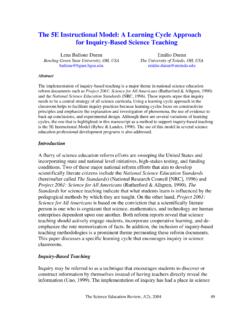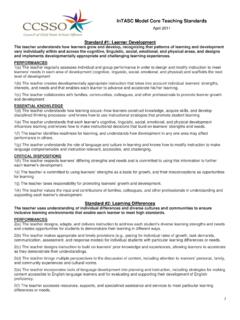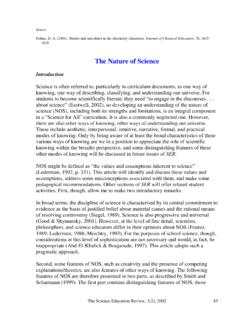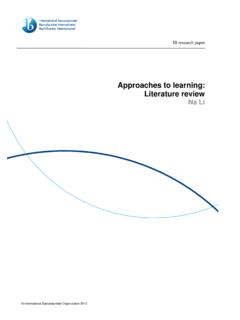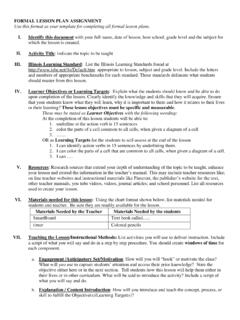Transcription of What Is Competency- Based Education? - Aurora Institute
1 What Is competency - Based education ? An Updated DefinitionWRITTEN BY:Eliot LevineSusan PatrickWhat Is competency - Based education ? An Updated DefinitionWRITTEN BY:Eliot Levine, Susan PatrickAcknowledgmentsThe Aurora Institute (formerly iNACOL) deeply appreciates the members of the Technical Advisory Group on Developing a Working Definition of competency - Based education , who played an invaluable role in shaping this revised definition. We thank Chris Sturgis, co-founder of CompetencyWorks and now Principal of LearningEdge, who led the Technical Advisory Group and the development of the original working definition. We thank the following individuals who shared their substantial expertise: Laureen Avery, Ana Betancourt, Michael Burde, Kim Carter, Cris Charbonneau, Rose Colby, Margaret Crespo, Cory Curl, Julia Freeland Fisher, Jenni Gotto, Virgel Hammonds, Christina Jean, Paul Leather, Amalia Lopez, Christy Kingham, Michael Martin, Adriana Martinez, Rebecca Midles, Rosmery Milczewski, Gretchen Morgan, James Murray, Joy Nolan, Jennifer Norford, Karla Phillips, Linda Pittenger, David Richards, Antonia Rudenstine, David Ruff, Sydney Schaef, Don Siviski, Megan Slocum, Brian Stack, Wendy Surr, Cyndy Taymore, Eric Toshalis, Barbara Treacy, Claudette Trujillo, and Jonathan Vander Els.
2 Special thanks to the advisory group of Virgel Hammonds, Paul Leather, Linda Pittenger, David Ruff, and Natalie Slocum, who deeply reviewed the work of the Technical Advisory Group, supported the synthesis of the diverse voices emerging from that work, and contributed to this paper at multiple stages in its are grateful for the generosity and leadership of our funders. The support and partnership of the Nellie Mae education Foundation, Barr Foundation, Bush Foundation, Carnegie Corporation of New York, and Chan Zuckerberg Initiative have been invaluable in advancing knowledge in the field of personalized, competency - Based CompetencyWorksCompetencyWorks is a project of the Aurora Institute . It is a collaborative initiative dedicated to advancing personalized, competency - Based education in the K-12 education system. We are deeply grateful for the leadership and support of our advisory board and the partners who helped to launch CompetencyWorks: American Youth Policy Forum, Jobs for the Future, and the National Governors Association.
3 Their vision and creative partnership have been instrumental in the development of CompetencyWorks. Most of all, we thank the tremendous educators across the nation who are transforming state policy and district operations, as well as schools willing to open their doors and share their the Aurora InstituteThe Aurora Institute drives the transformation of education systems and accelerates the advancement of breakthrough policies and practices to ensure high-quality learning for , E. & Patrick, S. (2019). What is competency - Based education ? An updated definition. Vienna, VA: Aurora in this report is licensed under a Creative Commons Attribution International OF CONTENTSINTRODUCTION ..02A NEW DEFINITION OF competency - Based education ..03 BELIEF STATEMENTS ..04 FREQUENTLY ASKED QUESTIONS ..04 misconceptions ABOUT competency - Based education .
4 07 CONCLUSION ..07 RESOURCES ..082 | What Is competency - Based education ? An Updated DefinitionINTRODUCTIONC ompetency- Based education is being implemented at deeper levels in more schools every year. It is a major shift in school culture, structures, and pedagogy focused on ensuring that all students succeed and addressing the fundamental shortcomings of the traditional original working definition of competency - Based education was developed in 2011 at the National Summit for K-12 competency - Based education (Sturgis, Patrick, & Pittenger, 2011).1 The Summit was hosted by the Aurora Institute (formerly iNACOL) and the Council of Chief State School Officers, with more than 100 education innovators and practitioners attending. The working definition helped to build the field and create common understandings of key elements in competency - Based systems among stakeholders who were working separately and calling similar reforms by different names competency - Based , mastery- Based , proficiency- Based , and performance- Based education .
5 It has been used by schools as a basis for design and implementation, by states to establish supporting policies and a common vision, and by national organizations to provide frameworks for networks of states to discuss their years after creating the original working definition, feedback from across the field indicates that it should be updated to reflect a deeper understanding of key issues and developments in the field. This report presents the new definition, which was developed with extensive input from invited attendees at the second National Summit on K-12 competency - Based education in 2017 and from a technical advisory group of more than 40 experts and leaders in the field. The report also includes a set of belief statements, answers to frequently asked questions, and a brief discussion of common misconceptions about competency - Based education .
6 These provide essential context for understanding the definition and the field in which it is situated. Finally, resources are provided for further exploration of competency - Based education policies and Is competency - Based education ? An Updated Definition | 3A NEW DEFINITION OF competency - Based EDUCATIONThe field of K-12 competency - Based education is expanding, and knowledge is growing. From 2017 to 2019, CompetencyWorks engaged in a multi-stage, participatory process to update the 2011 working definition. The revised 2019 definition of competency - Based education is: 1. Students are empowered daily to make important decisions about their learning experiences, how they will create and apply knowledge, and how they will demonstrate their Assessment is a meaningful, positive, and empowering learning experience for students that yields timely, relevant, and actionable Students receive timely, differentiated support Based on their individual learning Students progress Based on evidence of mastery, not seat Students learn actively using different pathways and varied Strategies to ensure equity for all students are embedded in the culture, structure, and pedagogy of schools and education Rigorous, common expectations for learning (knowledge, skills, and dispositions) are explicit, transparent, measurable, and competency - Based school or district should implement all seven elements of the definition.
7 Strong implementation also requires policies, pedagogy, structures, and culture that support every student in developing essential knowledge, skills, and AND REVISED DEFINITIONS OF competency - Based EDUCATIONO riginal Definition of competency - Based education (2011)11. Students advance upon demonstrated Competencies include explicit, measurable, transferable learning objectives that empower Assessment is meaningful and a positive learning experience for Students receive timely, differentiated support Based on their individual learning Learning outcomes emphasize competencies that include application and creation of knowledge, along with the development of important skills and Definition of competency - Based education (2019)1. Students are empowered daily to make important decisions about their learning experiences, how they will create and apply knowledge, and how they will demonstrate their Assessment is a meaningful, positive, and empowering learning experience for students that yields timely, relevant, and actionable Students receive timely, differentiated support Based on their individual learning Students progress Based on evidence of mastery, not seat Students learn actively using different pathways and varied Strategies to ensure equity for all students are embedded in the culture, structure, and pedagogy of schools and education Rigorous, common expectations for learning (knowledge, skills, and dispositions) are explicit, transparent, measurable, and , Patrick, & Pittenger, 20114 | What Is competency - Based education ?
8 An Updated DefinitionPractitioners and policymakers need a concise definition of competency - Based education to enable clear communication and inform action. Realizing the promise of competency - Based education systems also requires examining a more extensive set of essential beliefs. The following belief statements complement and contextualize what we mean by the definition of competency - Based believe: competency - Based education is a replacement of the systems, structures, and pedagogies of the traditional system. competency - Based education is driven by the equity-seeking need to transform our educational system so all students can and will learn through full engagement and support and through authentic, rigorous learning experiences inside and outside the classroom. Equity is a central goal of advancing competency - Based education systems.
9 Communities that aspire to achieve equity must work toward implementing all elements of a competency - Based education system. All students can learn and must be challenged, believed in, and supported to achieve deep learning aligned with common , high expectations across the education system. Educators need to organize innovative learning environments around the needs of students who learn in different ways and in different time frames. Students need to learn academic knowledge and the skills and dispositions to apply it (such as growth mindset, self-regulation, social-emotional learning, and habits of success). Learning happens anytime and anywhere. Deeper learning is collaborative and socially embedded. Transparency of learning expectations and assessment results is essential for creating a culture of learning and section explains terms and concepts from the definition of competency - Based education and the accompanying belief do we mean by equity ?
10 The National Equity Project states, Educational equity means that each child receives what he or she needs to develop to his or her full academic and social potential. Working toward equity involves: Ensuring equally high outcomes for all participants in our educational system; Removing the predictability of success or failure that currently correlates with any social or cultural factor; Interrupting inequitable practices, examining biases, and creating inclusive multicultural school environments for adults and children; and Discovering and cultivating the unique gifts, talents, and interests that every human possesses. 2 The Great Schools Partnership states, Educational equity means ensuring just outcomes for each student, raising marginalized voices, and challenging the imbalance of power and privilege. 3 BELIEF STATEMENTSFREQUENTLY ASKED QUESTIONSWhat Is competency - Based education ?
